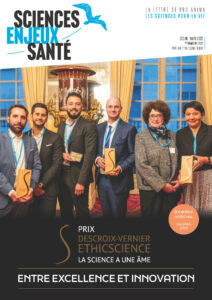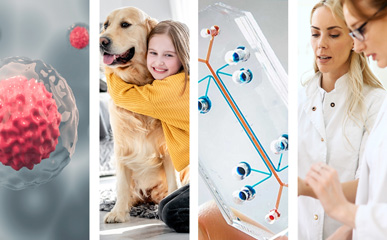
Displacing the gold standard, ICCS to advance animal-free science, Cambridge Uni spinout to find new treatments with AI and more
News on non-animal methods
SEPTEMBER 16 - 20, 2024NEWS, REPORTS & POSITION STATEMENTS
1. Chemicals regulation and non-animal methods : displacing the gold standard
Animal methods are increasingly seen as no longer the ‘gold standard’ for several reasons. In a new paper, Annamaria Carusi, Consulting Specialist at InterChange Research, discusses the need for a radical change in the framework for toxicity testing, particularly the shift away from animal testing towards non-animal methods in the context of regulating industrial chemicals in foodstuffs and consumer products.
The motivation for writing the paper stems from ethical, legal, and scientific reasons advocating for the reduction of animal testing, as well as the practical challenges associated with it, such as the high number of animals required, the cost, and the limitations in extrapolating results from animals to humans. The input used for the paper includes empirical data from two studies within a European Commission context promoting non-animal methods.
Read the post by Clemens Wittwehr, Senior Expert at the European Commission
2. Reimagining alternatives to animal testing
One paper published in Sage Journals found that 79.9 million animals were used in scientific procedures in 2015, an estimated 37% increase from 2005. There have also been unprecedented levels of funding in drug development in the last decade. However, the number of drugs failing to make it to market that have passed animal testing reached an all-time high of 95% in 2021, according to a review paper in the journal Nature. Thomas Hartung, professor of toxicology and director of the Johns Hopkins Center for Alternatives to Animal Testing, wants better science — and more options.
Artificial intelligence and organoid advances hold new promise for reducing the number of laboratory animals used in studies. In making the case for non-animal testing, Hartung thinks it’s best to focus on arguments around efficiency. When you highlight the efficiency of alternatives, that can open more doors. “We’re trying to form communities, … hundreds of people ultimately collaborating because they buy in” to the mission, he says.
3. ICCS to bring industry, nonprofit and regulators together to advance animal-free science
The International Collaboration on Cosmetics Safety (ICCS) gathers stakeholders in Washington, DC, US, on October 3rd for its first in-person meeting to accelerate the switch to animal-free science in cosmetics, to debate how to advance animal-free safety assessments of cosmetics for human and environmental safety. After the forum event next month, ICCS says it will host a post-conference, public workshop on “Building Confidence in NAMs for Regulatory Use : Opportunities to Advance Beyond the six-Pack of Acute Toxicity Tests.”
“We are honored to convene this global conference so our participants can discuss progress in many parts of the world in implementing NAMs and NGRAs,” says Erin Hill, ICCS, president and CEO. “Our mission is to work collaboratively with all stakeholders to accelerate the adoption of animal-free safety assessments for cosmetics and their ingredients globally.”
INTERVIEWS, NOMINATIONS & AWARDS
4. Noetik Selected to Participate in the 2024 AWS Generative AI Accelerator
NOETIK, an AI-native biotech company leveraging self-supervised machine learning and high-throughput spatial data to develop next-generation cancer therapeutics, announced that it has been selected for the second cohort of the AWS Generative AI Accelerator. Launched by Amazon Web Services, Inc. (AWS), the AWS Generative AI Accelerator identifies top early-stage startups that are using generative AI to solve complex challenges and help them scale and grow.
Participating in the AWS Generative AI Accelerator will support Noetik’s efforts to build and scale state-of-the-art generative models to discover and develop precision cancer therapeutics. As described in a recent technical report, Noetik has developed a custom vision transformer model called OCTO trained on proprietary human data generated in-house. OCTO aims to answer the question of “which drug, for which patients” and operate as a discovery engine both to identify the next generation of cancer therapeutics and predict clinical response.
TOOLS, PLATFORMS, CALLS
5. EU Roadmap towards phasing out animal testing — Call for evidence
The European Commission’s roadmap to phase out animal testing in chemical safety assessments will outline milestones and specific actions to phase out animal testing in such assessments. With the roadmap, the Commission will follow up on the commitment it made in a recent communication in reply to the European Citizens’ Initiative ‘Save Cruelty-free Cosmetics – Commit to a Europe without Animal Testing’.
The Call-for-Evidence on the Commission Roadmap towards phasing out animal testing for chemical safety assessments was published this week and is open for 4 weeks until 15 October.
6. Contribute to the Panorama of O&OoC projects in France
The BioValley France competitiveness cluster has been involved in coordinating and supporting the development of players in the healthcare sector since 2005. With a network of 295 members, it supports and brings together all the players in the Grand Est region to drive forward innovation in healthcare. Following the establishment of the maturity axes (System, Biology and Use), BioValley proposes a form, as a first step, to generate an overview of organoid and organ-on-chip projects and thus to show the richness and diversity of the work carried out in France in this field. In a second step, the aim is to choose one or more pilot(s) to promote for the French OOoC sector in a structured and hierarchical manner.
Deadline to complete the form : September 30, 2024.
Reply to the form (FR)
INDUSTRY, BIOTECH & PARTNERSHIPS
7. A Cambridge Uni spinout is using AI to find new treatments
While artificial intelligence (AI) promises to transform all manner of industries, the biggest game-changing breakthroughs in this new era of data-infused machine intelligence arguably lies in the field of drug discovery. By analyzing vast amounts of biological data, AI can help researchers predict how different chemical compounds will interact with specific targets in the body, accelerating the discovery of promising drug candidates. It’s against this backdrop that Cambridge University spinout CardiaTec is striving to tackle cardiovascular diseases (CVD).
The company has struck partnerships with 65 hospitals across the U.K. and the U.S., which are providing human heart tissue, which will help it build what it calls the “largest human heart tissue-multi-omics dataset,” spanning a broad gamut of biological information from across molecular biology to identify novel targeted therapeutics.
8. Chai Discovery, a startup focused on AI in biology, has raised nearly $30 million
Chai Discovery, a startup focused on artificial intelligence in biology, has raised nearly $30 million in funding just six months after its founding. Backed by major investors such as Thrive Capital and OpenAI, Chai aims to revolutionize drug discovery by leveraging AI to predict the structure of biochemical molecules and reprogram their interactions.
Chai’s AI foundation models are designed to predict molecular structures and reprogram how they interact, a crucial step in developing new medications. “We want to turn biology from a science into engineering,” said Joshua Meier, co-founder and CEO of Chai.
SCIENTIFIC DISCOVERIES & PROTOCOLS
9. Innovative intestinal model with integrated immune cells
Immune cells are not only found in the blood but also in tissues such as the intestine. Memory T cells can respond quickly in the event of an infection but sometimes the reaction is undesirable or exacerbated, such as in the case of side effects from medications. Until now, such effects could not be studied using organoids, as they lacked immune cells. Now, scientists from the Roche Institute of Human Biology (IHB) and the R&D department of the pharmaceutical company have developed an innovative human intestinal organoid model that also includes immune cells.
In the study recently published in the renowned journal Nature, the researchers used intestinal tissue from patients who had part of their intestines removed during surgery, isolated memory T cells and grew intestinal organoids from the mucosal cells. They then combined the immune cells with the organoids and observed how the T cells distributed themselves on and within the organoids – similar to the situation in the human gut.
Read the publication in Nature
10. Modeling memory B cell responses in a lymphoid organ-chip to evaluate mRNA vaccine boosting
Predicting the immunogenicity of candidate vaccines in humans remains a challenge. To address this issue, Jeger-Madiot et al. developed a lymphoid organ-chip (LO chip) model based on a microfluidic chip seeded with human Peripheral Blood Mononuclear cells (PBMCs) at high density within a 3D collagen matrix. Perfusion of the SARS-CoV‑2 spike protein mimicked a vaccine boost. Features of lymphoid tissue, including the formation of activated CD4+ T cell/B cell clusters and the emigration of matured plasmablasts, were recapitulated in the LO chip.
Importantly, myeloid cells were competent at capturing and expressing mRNA vectored by lipid nanoparticles, enabling the assessment of responses to mRNA vaccines. Comparison of on-chip responses to Wuhan monovalent and Wuhan/Omicron bivalent mRNA vaccine boosts showed equivalent induction of Omicron neutralizing antibodies, pointing at immune imprinting as reported in vivo. The LO chip represents a versatile platform suited to the preclinical evaluation of vaccine-boosting strategies.


